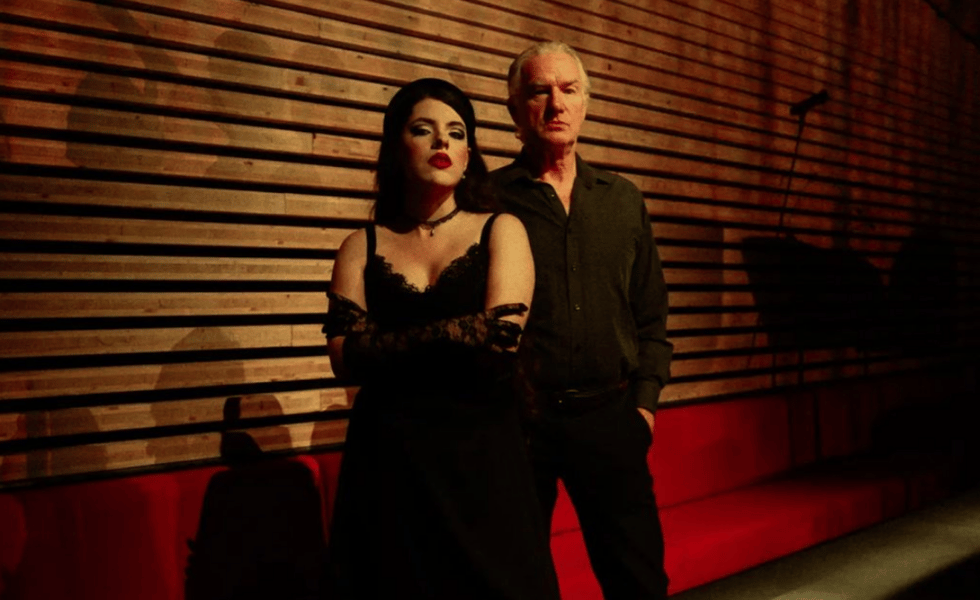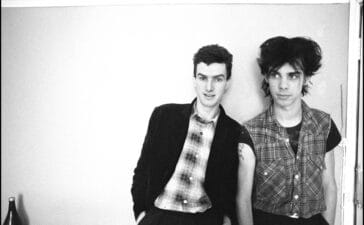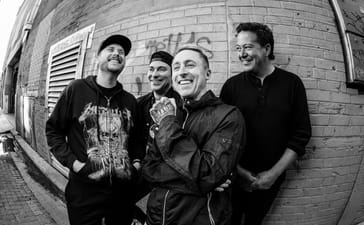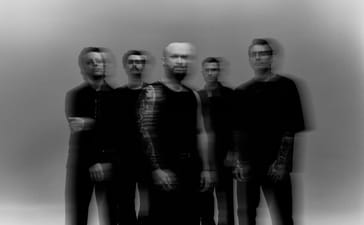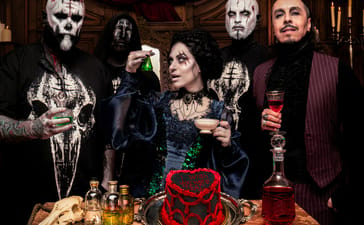Harvey and his collaborator Amanda Acevedo reflect on their new album, the enduring influence of The Birthday Party, and the road ahead for Harvey and the Bad Seeds
In a dimly lit room tucked away in North Melbourne, Mick Harvey and Amanda Acevedo sit on a worn couch, the kind that’s seen more years than most people would care to count. The air is thick with the scent of old vinyl and incense, and behind them, a curious orb of purple light hovers—almost too perfectly placed, like something out of a magic realist novel.
If someone were to walk in at this very moment, they might wonder whether they were witnessing the meeting of a wizard and his apprentice—or perhaps, just Mick and Amanda, sharing an afternoon’s conversation about music, art, and everything in between.
They’re in the middle of telling the story of their first meeting, which—given their current relaxed banter—feels as though it could’ve been written in the margins of a far more dramatic tale. It was 2017. Mexico City. Acevedo was just a teenager, wide-eyed and still in the early days of her musical journey. Harvey, meanwhile, was already an enigmatic figure—a towering presence in the world of music, most famously known for his work with The Birthday Party and Nick Cave & The Bad Seeds. But back then, Acevedo wasn’t just another fan. She was about to meet her idol, and maybe, just maybe, a kindred spirit.
“I made the first move,” Harvey admits, like someone confessing to an innocent misstep, but with the kind of modesty that only someone of his stature could pull off.
“I was a big fan of his work,” Acevedo adds, her smile almost sheepish, as if it’s still a little surreal that she’s sitting next to the very man whose music had already become the soundtrack to parts of her life.
Harvey, never one to let a moment pass without his signature self-deprecation, adds with a glint in his eye, “Then she realised I was a complete fake.”
It’s that easy, effortless rhythm between them—the kind of banter that suggests they’ve known each other far longer than the years they’ve spent creating music together. The two bounce ideas off each other with such a casual air that it’s almost hard to believe how deeply they trust one another. It’s the kind of relationship where honesty flows as freely as the conversation, and both know that’s exactly what makes their creative partnership tick.
“And then he contacted me and asked if I wanted to come to the festival,” Acevedo continues, the story unfolding in a way that feels like pages turning on their own. But then, there’s a twist—the kind that only a parent could provide. Acevedo’s dad, understandably cautious about his daughter heading off to a foreign festival with a man she’d just met, took the time to scour Harvey’s Instagram. What did he find? A series of cat pictures. And not just one or two.
“He probably thought, ‘Who’s this weird guy with the cat pictures?’” Harvey laughs, his chuckle echoing softly in the room. “I’ve toned it down a bit since then. But, you know, there are still some cat pictures.” He pauses, almost as if letting us in on a secret, “There are still some.”
So, from cat memes to music-making, the relationship grew—slowly, almost imperceptibly at first, like the sound of a distant storm that gets closer with every passing moment. The pandemic came, as it did for so many, bringing with it a strange stillness. Acevedo, in the midst of finding her voice as an artist, reached out to Harvey for advice, and as she recounts it, “It was just for fun.” But what started as a simple, casual exchange soon evolved into something far more tangible—an actual song.
“I said recording a song might be a step too far,” Acevedo says, the smile now wider, almost mischievous.
Harvey laughs. “But to my surprise, it sounded really good. We recorded my vocal on it, and it just…worked.”
Acevedo never dared ask to do it again, at least not initially. But, of course, Harvey, in his usual understated fashion, was the one to ask her. And from there, the music poured out. Two albums, now including Golden Mirrors (The Uncovered Sessions Vol. 1), are the fruits of that collaboration. A project that began almost accidentally has now blossomed into a full-blown artistic partnership—one that’s only just beginning.
For Harvey, though, the magic of collaboration, much like the cat pictures, isn’t always as effortless as it might seem.
“Certain things are a bit magical,” he says, the philosopher in him peeking through for a moment. “But it’s not like that all the time. There’s a lot of hard work that goes into it. Some things come easily, some things come harder. But overall, it has felt very easy.”
Acevedo, reflecting on their creative process, says, “We realised that all the songs had a similar theme and feel. That’s how the album took shape. It had cryptic lyrics, magical creatures, and things like that.” She pauses, grinning. “It’s all very surreal.”
Harvey, however, offers his perspective, shaking his head slightly as if to remind us not to get too caught up in the wonder of it all. “But really,” he says with the quiet wisdom that only time can bring, “it’s just acting as a metaphor for other things.”
One of the most remarkable aspects of their partnership is Harvey’s willingness to guide Acevedo—not through the usual heavy-handed mentorship but with a gentleness that makes her feel both free and supported. He’s not telling her what to do; he’s showing her how to do it. And really, Acevedo’s all the better for it.
“He’s very open,” Acevedo says, as if it’s the simplest truth in the world.
Harvey’s openness, Acevedo believes, stems from his punk roots—his early days with The Birthday Party, a time when anything was possible, and the mere act of making any noise was art. “Back then, anything was possible,” Harvey says, a hint of nostalgia creeping into his voice. “Punk was about breaking everything down to its basics, then making the art, making the statement.”
But punk didn’t stay pure for long. “It became commodified too quickly,” Harvey laments, the smile gone from his face for a moment, replaced by something a bit more reflective. “You have naïve young people who don’t know what they want to do, being approached by people with money. It just lost its focus real fast.”
Yet, even as the world around him has changed, the spirit of punk—the spirit of rebellion, of making something out of nothing—has remained firmly intact in Harvey. “Ollie Olsen said, ‘Make art, not music.’ So that’s what I try to do. You can hear it today, when people are just playing music and not making art.”
The legacy of The Birthday Party, however, still lingers. The ripples they left behind can be heard in the music of bands like Fontaines D.C., whose post-punk energy recalls that of Harvey’s early work. But when I mention the connection, Harvey’s reaction is immediate.
“I listened to them a couple of days ago. Musically, I found them to be straight. From the recordings, I didn’t get the feeling of edgy. There was no approach to being particularly individual or different.”
As for his future with Nick Cave or the Bad Seeds, Harvey is blunt—no grand gestures, no long speeches, just a simple truth. “There’s no plans. It’s not off the table, but it’s not on the table. There is no table.”
And with that, the conversation shifts again, back to where it all began: the music, the collaboration, the future. “We have more ideas for future albums,” Harvey drops casually, as if it’s no big deal. “Eight or nine, maybe.”
Amanda, ever the co-conspirator, nods in agreement. “But we want to keep it all original now.”
And in that moment, you can see it: the spark, the glint in Harvey’s eye. The fire’s still in there. The story is far from over.
Golden Mirrors (The Uncovered Sessions Vol. 1) was released on March 28. The album can be purchased here.


